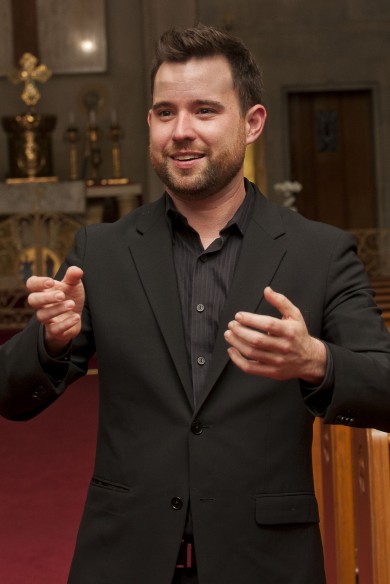Quigley leads New World in musical mashup from Monteverdi to Reich
A major score by a pioneering minimalist composer brought the New World Symphony and Seraphic Fire together on Saturday night for the latest installment of the orchestra’s “Sounds of the Times” series. The avant garde evening encompassed musical vaudeville as well as a Baroque interlude. Seraphic Fire artistic director Patrick Dupré Quigley was on the podium.
György Ligeti was an influential Hungarian modernist who broke away from the folk-based compositional style of Bartok and Kodaly to experiment with atonal and micro-polyphonic techniques.
He also exhibited a wry sense of humor and sarcasm. In one of his keyboard etudes, the pianist goes through the motions of playing a bravura vignette without actually playing a note. Quigley described Ligeti’s Adventures and New Adventures as “Dadaistic cabaret” and indeed the scores mock concert convention and operatic tradition.
Soprano Estelí Gomez, mezzo Virginia Warnken and bass Cameron Beauchamp came on stage at the New World Center in concert attire as if they were about to perform a song cycle or oratorio. Far from it. Ligeti opens with the singers breathing over sustained chords from the instrumental ensemble of horn, flute, cello, bass, 2 pianos and percussion. The singers whisper and intone verbal gibberish and nonsense syllables, at one point yelling into megaphones.
Gomez sang outrageously high coloratura one moment and vocalized while holding her nose the next. At times all three singers pretended to gag. The percussionist struck the piano’s strings, tore and crumbled a newspaper page and smashed a coffee serving set.
These pieces are hilarious send-ups of 1960’s trendy compositional techniques. The three singers acted their roles like born comics and handled the crazy vocal gymnastics with aplomb. Ligeti’s comedic entertainment was utterly diverting, reminding audience and artists alike that they need to lighten up and not take themselves so seriously.
Between the antics conceived by Ligeti, Monteverdi’s 17th century Beatus vir offered gorgeous vocal writing and rollicking Baroque rhythms. Fielding a choir of 7 voices with 2 violins, cello, bass and harpsichord accompaniment, Quigley was clearly in his element. With the high sopranos carrying the felicitous melodic lines, Margot Rood’s exquisitely voiced solos were a standout. Quigley’s conducting was crisp and idiomatic, yet flexible. He melded voices and instruments to exuberant effect in the final “Gloria.”
Along with Terry Riley and La Monte Young, Steve Reich was one of the early proponents of minimalism. In response to the perceived artistic bankruptcy of serialism and aleatoric (or chance) music, these composers conceived a tonally based compositional style concentrated on repetitive rhythmic figures.
Reich’s early works were short pieces written for his own keyboard and percussion ensemble. His choral-orchestral work The Desert Music represents one of his early attempts to write for larger, more conventional forces. Based on the poetry of William Carlos Williams, an iconic inspiration to the ‘beat generation’ of the 1950’s and 60’s, the score was presented in a reduced version, arranged by conductor and contemporary music specialist Alan Pearson.
Amplification is an integral part of Reich’s scoring. With the 6 female and 4 male singers placed on opposite sides of the stage (microphones in front of each vocalist), Quigley still managed to coordinate the choral sonority effectively. Williams’ text was projected on a screen with individual syllables gradually turning into words, just as in the choral setting. The smooth corporate vocalism sounded like a pop or jazz backup chorus.
The Desert Music is a transitional work in Reich’s output. There are thematic elements of Copland-infused folksiness and neo-Baroque fragments. Reich’s boundless energy can be exciting and hypnotic but there are sections of the 46-minute work that turn monotonous. One of the score’s most effective moments is a female chorale warning of nuclear holocaust. Here Reich’s musical discourse turns dark and ruminative. The pulsating conclusion with vibrant orchestral timbres is prime Reich.
The choral writing spans a huge vocal range and the singers were terrific, particularly the female voices. String playing was absolutely stunning in rhythmic exactitude and cohesion.
Unfortunately, perhaps due to the audio mix, orchestral balance was uneven and the brass were sometimes overpowering. Quigley led an efficient, well-prepared reading that would have benefited from more thrust. Too often the rhythms emerged as stiff and mechanistic.
The New World should program some of Reich’s later. more mature scores. His orchestral showpiece The Four Sections, the innovative Different Trains for string quartet and taped narration and his Pulitzer Prize winning Double Sextet need to be to be heard in South Florida.
The New World Symphony’s Sounds of the Times series concludes 7:30 p.m. April 30 at the New World Center in Miami Beach with Michael Tilson Thomas conducting the premiere of his Four Preludes on Play Things of the Wind with soprano soloist Measha Brueggergosman and Timo Andres as piano soloist in his Tides and Currents. nws.edu; 305-673-3331.
Posted in Performances, Uncategorized
2 Responses to “Quigley leads New World in musical mashup from Monteverdi to Reich”
Leave a Comment
Sun Apr 17, 2016
at 11:48 pm
2 Comments






Posted Apr 18, 2016 at 6:47 pm by Esther Nahm
“The New World should program some of Reich’s later. more mature scores. His orchestral showpiece The Four Sections, the innovative Different Trains for string quartet and taped narration and his Pulitzer Prize winning Double Sextet need to be to be heard in South Florida.”
The New World Symphony has already programmed the Reich Double Sextet for next season, 11/20 at 2:00. For more information: https://www.nws.edu/events-tickets/subscriptions/
Hope to see you there!
Posted Apr 19, 2016 at 11:37 am by David Gween
Although i’m an untrained ear, to me senses, this rendition of The Music was exceptional. I welcome the combining of two world class organizations NWS and Seraphic Fire.